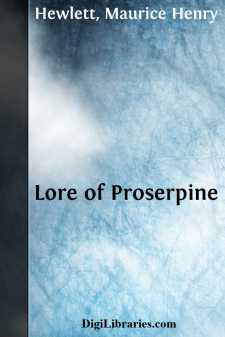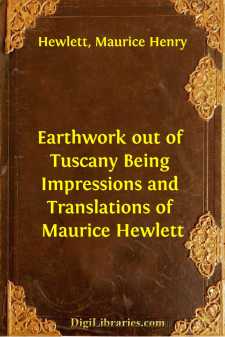Categories
- Antiques & Collectibles 13
- Architecture 36
- Art 48
- Bibles 22
- Biography & Autobiography 815
- Body, Mind & Spirit 144
- Business & Economics 28
- Children's Books 18
- Children's Fiction 14
- Computers 4
- Cooking 94
- Crafts & Hobbies 4
- Drama 346
- Education 58
- Family & Relationships 59
- Fiction 11835
- Games 19
- Gardening 17
- Health & Fitness 34
- History 1378
- House & Home 1
- Humor 147
- Juvenile Fiction 1873
- Juvenile Nonfiction 202
- Language Arts & Disciplines 89
- Law 16
- Literary Collections 686
- Literary Criticism 179
- Mathematics 13
- Medical 41
- Music 40
- Nature 180
- Non-Classifiable 1768
- Performing Arts 7
- Periodicals 1453
- Philosophy 65
- Photography 2
- Poetry 896
- Political Science 203
- Psychology 44
- Reference 154
- Religion 515
- Science 126
- Self-Help 85
- Social Science 83
- Sports & Recreation 34
- Study Aids 3
- Technology & Engineering 59
- Transportation 23
- Travel 463
- True Crime 29
Maurice Henry Hewlett
Maurice Henry Hewlett was an English historical novelist and poet, best known for his romantic and adventurous tales set in medieval times. His most famous work, "The Forest Lovers" (1898), showcases his fascination with chivalry and the Middle Ages. Hewlett's vivid storytelling and rich descriptions garnered him a significant readership in the late 19th and early 20th centuries.
Author's Books:
Sort by:
INTRODUCTION Cada puta hile (Let every jade go spin).—SANCHO PANZA. Almost alone in Europe stands Spain, the country of things as they are. The Spaniard weaves no glamour about facts, apologises for nothing, extenuates nothing. Lo que ha de ser no puede faltar! If you must have an explanation, here it is. Chew it, Englishman, and be content; you will get no other. One result of this is that...
more...
THE WINDOWS You will remember that Socrates considers every soul of us to be at least three persons. He says, in a fine figure, that we are two horses and a charioteer. "The right-hand horse is upright and cleanly made; he has a lofty neck and an aquiline nose; his colour is white and his eyes dark; he is a lover of honour and modesty and temperance, and the follower of true glory; he needs no...
more...
OF COUNT RICHARD, AND THE FIRES BY NIGHT I choose to record how Richard Count of Poictou rode all through one smouldering night to see Jehane Saint-Pol a last time. It had so been named by the lady; but he rode in his hottest mood of Nay to that, yet careless of first or last so he could see her again. Nominally to remit his master's sins, though actually (as he thought) to pay for his own, the...
more...
I An observant traveller, homing to England by the Ostend-Dover packet in the April of some five years ago, relished the vagaries of a curious couple who arrived by a later train, and proved to be both of his acquaintance. He had happened to be early abroad, and saw them come on. They were a lady of some personal attraction, comfortably furred, who, descending from a first-class carriage, was met by a...
more...
APOLOGIA PRO LIBELLO: IN A LETTER TO A FRIEND Although you know your Italy well, you ask me, who see her now for the first time, to tell you how I find her; how she sinks into me; wherein she fulfils, and wherein fails to fulfil, certain dreams and fancies of mine (old amusements of yours) about her. Here, truly, you show yourself the diligent collector of human documents your friends have always...
more...
IN A GREEN SHADE ROUND ABOUT A PREFACE The title has become equivocal, since there are more green shades in employment now than were dreamed of by Andrew Marvell. Science is a great maker of homophones, without respect for the poets. There is, for instance, the demilune of lined buckram borne by the weak-eyed on their foreheads, the phylactery of the have-beens—I lay myself open to be believed a...
more...
VANNA IS BID FOR Not easily would you have found a girl more winning in a tender sort than Giovanna Scarpa of Verona at one and twenty, fair-haired and flushed, delicately shaped, tall and pliant, as she then was. She had to suffer her hours of ill report, but passes for near a saint now, in consequence of certain miracles and theophanies done on her account, which it is my business to declare; before...
more...
PROEMSing of the end of Troy, and of that floodOf passion by the bloodOf heroes consecrate, by poet's craftHallowed, if that thin waftOf godhead blown upon thee stretch thy songTo span such store of strongAnd splendid vision of immortal themesLate harvested in dreams,Albeit long years laid up in tilth. Most meetThou sing that slim and sweetFair woman for whose bosom and delightParis, as well he...
more...
O what is this you've done to me,Or what have I done,That bare should be our fair roof-tree,And I all alone?'Tis worse than widow I becomeMore than desolate,To face a worse than empty homeWithout child or mate.'Twas not my strife askt him his lifeWhen it was but begun,Nor mine, I was a new-made wifeAnd now I am none;Nor mine that many a sapless ghostWails in sorrow-fare—But this does...
more...
THE RUINOUS FACE When the siege of Troy had been ten years doing, and most of the chieftains were dead, both of those afield and those who held the walls; and some had departed in their ships, and all who remained were leaden-hearted; there was one who felt the rage of war insatiate in his bowels: Menelaus, yellow-haired King of the Argives. He, indeed, rested not day or night, but knew the fever...
more...











